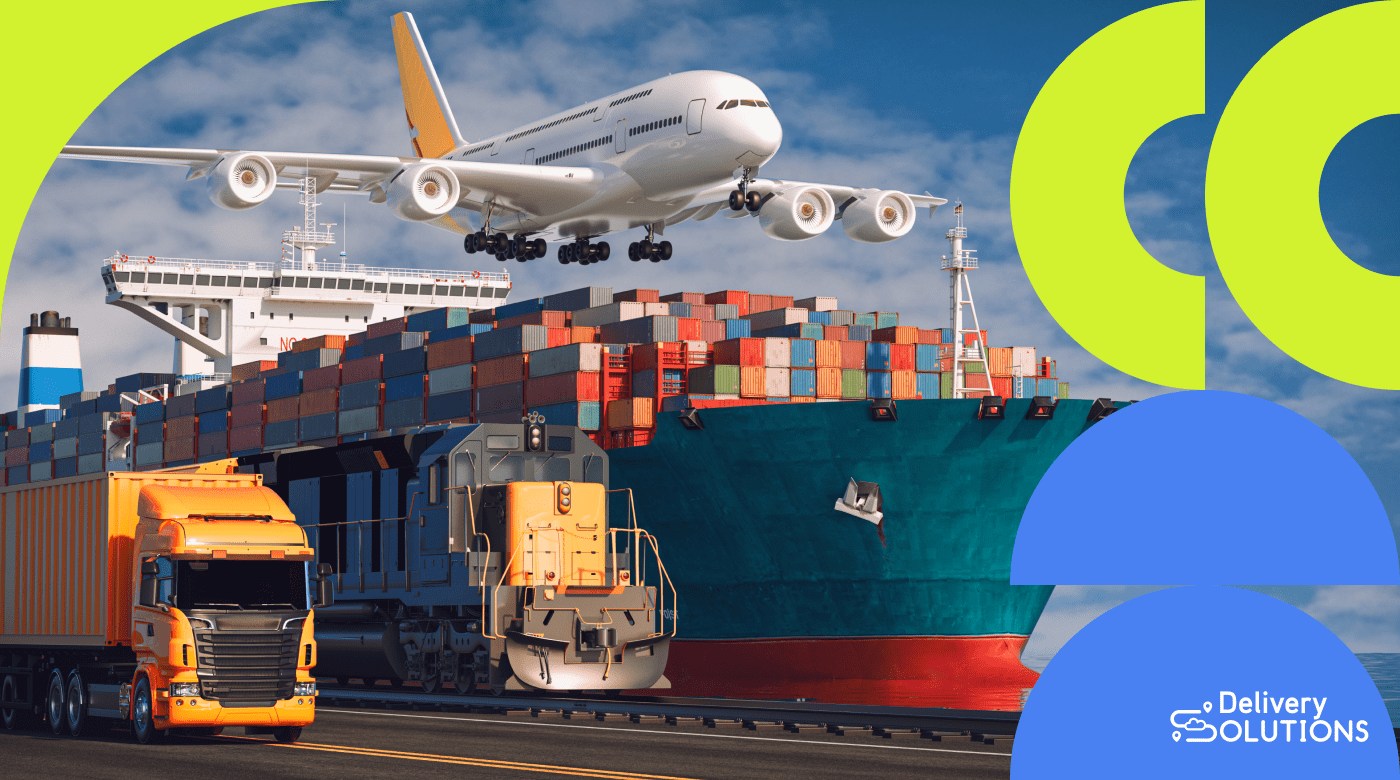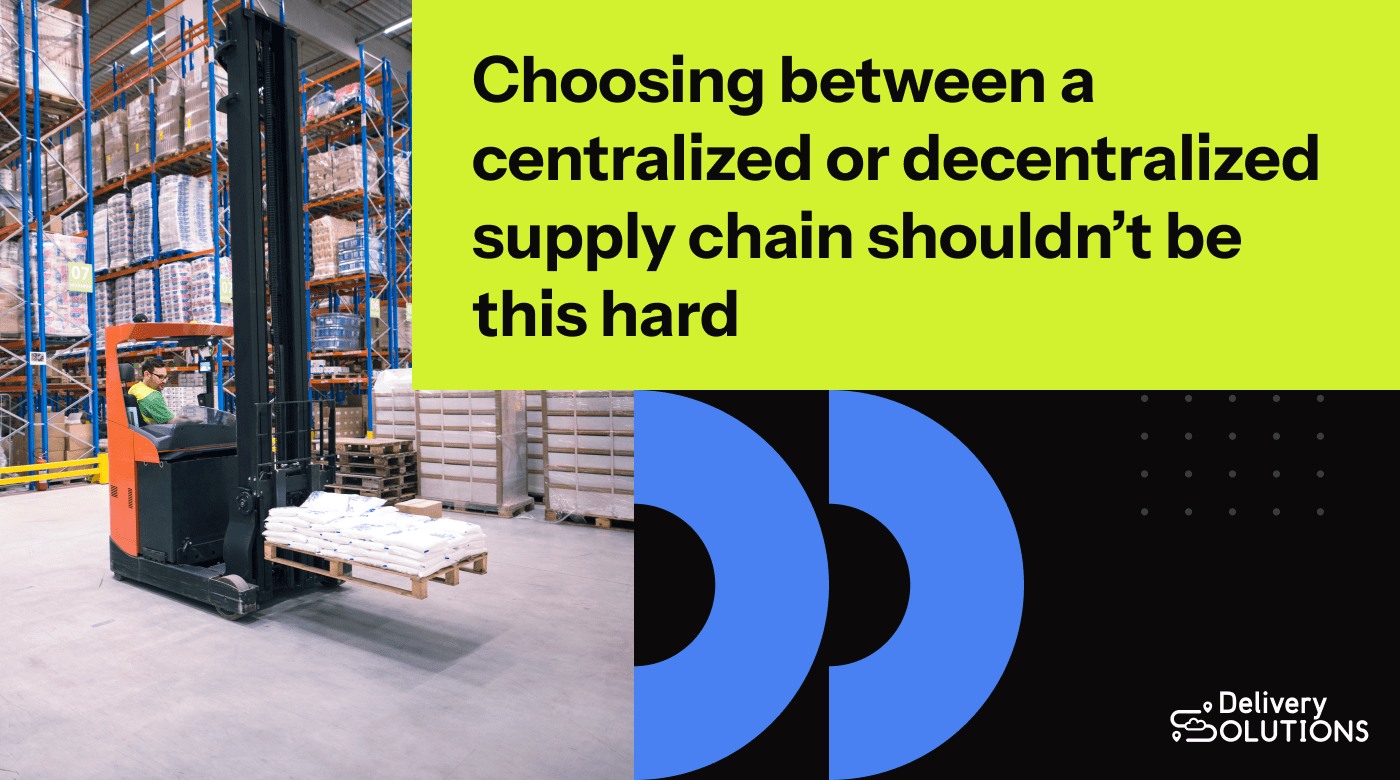It's a perpetual dilemma. Do you prefer the simplicity of a centralized logistics model? Or explore decentralized ones? Centralized logistics is predictable and systematic, while decentralized logistics offers adaptability and strategic diversity.
Centralized logistics offers simplicity and ease of management. It provides a clear view of your logistics, making coordination a breeze.
But decentralized logistics enables organizations to quickly adjust to market demands.
In this article, we delve into centralized and decentralized logistics systems and how you can decide which is best for you.
What is centralized logistics?
Centralized logistics centralizes control functions and decision points into one location. A central hub manages procurement, production, distribution, and inventory, all under one directive. A single warehouse can be used to manage production schedules, inventory, and distribution.

A centralized logistics machine achieves efficiencies by leveraging economies of scale. Bulk purchasing and production maximizes cost efficiencies, translating to streamlined and optimized logistics.
Centralized logistics provides visibility in all the logistical aspects. With centralization, managers can oversee inventory, production, and supply in real time.
As the organization evolves, it needs to strike a balance between centralization and adaptability. Many organizations also discover that a centralized system with some decentralization works best.
Given its simplicity and control, the centralized logistics model is ideal for new businesses. We cover this in greater detail below. However, not all companies need to move from a centralized to a decentralized system.
For example, Inditex, the world's largest clothing retailer, operates in 202 markets with 7,420 stores globally. Its success is largely thanks to an innovative centralized logistics system. Inditex's method prioritizes proximity to production and efficient automation.
Advantages of centralized logistics
The key advantage of centralized supply is that it keeps things simple. As such, it's ideal for companies starting out or operating in limited locations.
Companies can streamline operational costs, such as maintenance and staffing, to lower expenses. Centralized logistics usually also have sophisticated tracking and monitoring systems. Since the system isn't complicated, managers have good real-time information on what's happening.
Standardized quality control measures are also inherent in centralized processes. Teams can ensure consistency in product or service delivery. This means customers can expect the same high standards regardless of location.
Disadvantages of centralized logistics
The primary drawback of a centralized logistics system is that it presents a singular point of failure with no backup. As such, it's vulnerable to disruptions. Failures at the center can lead to widespread and severe consequences downstream.
Centralized systems also face challenges in adapting swiftly to changes. This lack of agility can hinder responsiveness to dynamic market conditions. Centralized setups may struggle to adapt promptly to changing demand or logistical issues.
Another drawback is the potential for higher shipping costs. Concentrating distribution in a central location may require products to travel longer distances to reach diverse markets, leading to increased transportation expenses. This can be particularly disadvantageous when dealing with a geographically dispersed customer base or diverse regional markets.
What is decentralized logistics?
Decentralized logistics disperses logistical functions across locations, reducing reliance on a central hub for control. In this model, different nodes or participants within a network are responsible for operations. Think of a decentralized logistics model as multiple semi-centralized distribution centers connected.

Decentralized logistics enables a more flexible transportation and information management approach than conventional centralized systems. In a decentralized setup, distribution centers operate autonomously, making quick decisions tailored to local demands.
The theory is that distribution hubs tailored to specific geographical and market conditions better manage demand than fixed, central ones. For example, Delivery Solutions can help you get real-time delivery rates for locations and assign packages to partners from a central interface.
As such, decentralization allows more efficient resource utilization and can, therefore, result in better customer satisfaction, reduced costs and is more sustainable. This flexibility enhances responsiveness and effectiveness, contributing to a more resilient and adaptive logistical ecosystem.
An example of a decentralized logistics model, particularly in the retail sector, is a distributed order fulfillment network. Instead of relying on a central warehouse for all inventory, retailers use a network of local fulfillment centers or leverage existing stores.
Delivery Solutions Intelligent Contract Management speeds up your go-to-market strategy. You can manage multiple delivery solution providers (DSPs) without direct contracts."
Delivery Solutions Intelligent Contract Management is designed to accelerate your go-to-market strategy by providing instant access to multiple delivery solution providers (DSPs) without the need for direct contracts. Through our omnichannel platform, you can seamlessly integrate hybrid models while retaining existing contracts, ensuring minimal disruption.
Each fulfillment center operates independently, managing inventory and fulfilling orders for its region. This decentralized approach reduces shipping distances, leading to faster deliveries and lower shipping costs. It also allows retailers to adapt quickly to regional demands, optimize inventory levels, and enhance overall efficiency in the order fulfillment process.
Advantages of decentralized logistics
The key advantage of decentralized setups is their ability to build resilience through redundancy. Distributing functions across multiple points makes the organization functional even if certain nodes are disrupted. The lack of fallback options in centralized logistical systems makes them more prone to failure.
Decentralized logistics also offers better scalability. As resources and systems are distributed across multiple locations, the organization can easily grow and handle more work as needed. Each point can independently adjust to increased demands, making it more adaptable than centralized systems.
Companies can also greatly reduce transportation costs by spreading out their distribution centers. For example, consider a retail company with various regional hubs. When the retailer receives an order, it assigns it to the nearest hub for fulfillment, minimizing travel distance. This not only reduces transportation costs but also provides quicker deliveries. The result is a more cost-effective and resource-efficient logistics operation, enhancing customer satisfaction and operational sustainability.
The biggest advantage of decentralized logistics is its ability to rapidly adapt to local trends and regulations.
Consider a global food delivery service, which needs to manage shipping logistics efficiently. The company can leverage its retail storefronts as distribution centers, strategically shipping products from these locations to reduce delivery times and costs. By decentralizing its operations, it optimizes distribution centers, ensuring orders are fulfilled from the most suitable location.
Moreover, the company integrates multiple delivery providers through a unified shipping platform like Delivery Solutions OXM, simplifying the management of relationships and contracts. With pass-through billing and reconciliation, the company saves time and effort by receiving consolidated invoices monthly, eliminating the need for individual agreements and paperwork. This decentralized approach allows the company to adhere to local food safety regulations and delivery standards while meeting specific market requirements effectively.
Disadvantages of decentralized logistics
While decentralized logistics are the next step for any company planning to expand its operations, they aren't easy to pull off. Specifically, coordinating activities across various locations can be very challenging if all operations don't have a unified framework.

Each location presents its difficulties that the company must address. A company using decentralized warehouses starts from scratch at every new location. Consequently, each new hub will have a learning curve. If not managed properly, local issues can quickly result in coordination gaps.
The primary issue here is the corporate know-how that made the business successful in past endeavors may not apply to a new setting. As such, the absence of centralized control can result in suboptimal resource utilization.
Local autonomy, while fostering flexibility, may lead to inefficiencies as decision-making becomes compartmentalized. This decentralization drawback can hinder a holistic optimization of resources, affecting the overall efficiency of the logistics network. Striking a balance between local autonomy and centralized oversight becomes crucial to mitigate these disadvantages.
Which one is right for you?
Choosing a logistics strategy depends on many factors. Specifically, the question here is which model can help the business cater to its market most efficiently. The following strategies can be a good starting point.

Tailor the logistics to the company's growth stage
Companies will have different logistical requirements at different places in their lifecycle. Centralized logistics can be a logical starting point for startups and local businesses operating within a confined market.
For example, a boutique artisanal bakery with a single-location storefront can centralize production and distribution from a local kitchen. Conversely, a multinational conglomerate undergoing expansion may prefer decentralized logistics with strategically placed regional hubs.
Align logistics with product assembly requirements
One strategic approach to aligning logistics with product assembly requirements is to integrate orchestration capabilities. For businesses requiring on-site assembly or those safeguarding sensitive technologies, centralized operations ensure security and quality control, such as in the case of an electronics manufacturer protecting trade secrets.
Alternatively, a fashion brand with a diverse market presence can leverage decentralized warehouses. For instance, distribution centers in different regions may specialize in seasonal apparel variations to meet regional demands effectively.
Companies can streamline processes, optimize customer interactions, and tailor workflows by product type, location, and customer preferences using orchestration technologies. This ensures a seamless and efficient omnichannel experience, enhancing customer satisfaction and brand loyalty across diverse markets.
Use logistic models to mitigate business risks
Some business models are riskier than others. As such, their logistical setup should address their liabilities regardless of where they may be in their life cycle.
Decentralized logistics offer a good safety net in industries where resilience is paramount. For example, consider a pharmaceutical company distributing critical medications. Redundant distribution centers can ensure continuous supply even during disruptions. The company may be compelled to decentralize its operations if dealing with critical life-saving medications.
Likewise, while efficient, a single data center for a tech giant poses a substantial risk. Any disruption to this central hub could lead to widespread service outages. This is also why cloud services (which are inherently decentralized) have become the de-facto model in modern IT.
Delivery orchestration can make any logistics system simpler
New technology can create options that were previously not available to companies. For instance, businesses often don't decentralize their logistics because they lack the necessary tools. With modern cloud-based systems, small businesses can now use delivery orchestration methods previously only available to large enterprises.

Delivery orchestration is useful here as it helps streamline centralized and decentralized logistics with a unified platform. It differs from regular logistics management's emphasis on real-time coordination and adaptability.
Traditional logistics management centers on planning and execution; delivery orchestration uses advanced technologies like real-time tracking and route optimization to dynamically adapt to changing conditions, like traffic, weather, and delivery preferences.
Modern orchestration technologies can help bring the advantages of centralized logistics to decentralized systems.
For example, it empowers decentralized logistics with a cloud-based platform, enabling local autonomy and quick decision-making. Managers can stay informed about all local subsidiaries, mirroring the oversight they'd have in a centralized system. This is possible through cloud-based orchestration technologies offered by Delivery Solutions.
Delivery Solutions' omnichannel experience products for everything after the sale help enterprise retailers scale with flexible options that boost savings and brand loyalty.
Interested in finding out more? Shoot us a message... We'll be happy to answer any questions.
Russ Bair
Russ Bair is the Chief Product Officer at Delivery Solutions, the leading provider of last-mile delivery and fulfillment software. He helps ensure retailers achieve their goals and they are able to provide meaningful experiences for their customers. Prior to his tenure at Delivery Solutions, Russ was President of projekt202—an experience-driven consulting firm founded to apply deep ethnographic research to the development of mobile, web, and workplace software. He received his Bachelors in Computer Science from Texas A&M and has more than 25 years of extensive experience in the software development and consulting fields. While holding leadership roles within organizations or various sizes, Russ has designed, developed, and led the creation of complex custom software implementations for small, medium, and Fortune 500 companies across the United States. Russ is fulfilled by helping those around him reach their potential through servant leadership and collaborating to create progress and economic value. He currently lives in the Dallas area with his wife Jana and two children.
